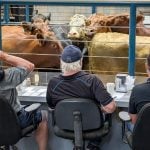Like many other high-level corporate leaders, when COVID-19 was starting to become a serious issue in Canada in the spring of 2020, Syngenta Canada president Trevor Heck was under pressure to put together a team to deal with the new and unprecedented realities unfurling every day.
“At the time, I was just thinking about the functionality of the group, making sure you had different departments and skill sets at the table,” Heck recalls.
The team got to work; it began finding ways for the company to cope with the evolving situation, and something struck Heck about the team and the reason it was proving so effective.
Read Also

‘No agenda, no attenda’: How to professionalize your family farm meetings
Establishing meeting ground rules can help a farm family find ways to communicate that work for the business and the family.
“It wasn’t due to the individual skill sets,” he says he realized. “It was due to the diversity of individual circumstances that it represented.”
The new COVID-19 team represented a broad swath of the employee base. And while it had gender diversity with five women and three men on the team, it also reflected the many diverse impacts that the pandemic was having on different people within the company. “We had a lot of different perspectives that were weighing in.”
“And although starting a team that’s quite diverse, early on, takes a while to get the momentum going, once we did, we were a much better team than if we would have been from a very narrow sliver of the organization in terms of demographics and gender,” Heck says. “In the end, it raised the bar in terms of the overall performance of the team, and generated a much better result for the organization by having that diversity.”
Diversity in the DNA
If anything, COVID-19 heightened Syngenta’s appreciation of the importance of its ongoing commitment to diversity, equity and inclusion (DEI) in its daily operations, values, practices and programs.
Part of it is no surprise. Syngenta is a global company based in Switzerland with 28,000 employees across almost every major agricultural region. In order to thrive in that context , it must have an inclusive culture, Heck says.

“It’s part of our DNA of being a global company,” he says. “We’re a company that is driven by research and development and bringing new technology to customers. There is a belief that having a diverse team, and an inclusive culture that supports that diverse team leads to greater teamwork within the organization. We feel that we’re going to benefit from diverse perspectives, and it’s going to drive innovation.”
But that still leaves the question: How do you do you incorporate diversity in a way that brings those benefits?
A key early learning was that buy-in from leadership was crucial. Active diversification is a top-down process that must be supported by the company’s leaders.
“What we learned is that you have to focus in order to get the progress that you’d like to make,” Heck says. “From a leadership perspective, we had to get organized to make sure we were focusing in the right areas and getting the best results for the employees.”
But it’s also an empowering process that is being driven by the employees themselves. Syngenta has had employee resource groups (ERGs) for the past few years. These voluntary, employee-led groups act as a resource for both employees and the community by developing awareness through communications efforts, strategic events and engagement opportunities.
There are three global groups: for young professionals, women and LGBTQ (lesbian, gay, bisexual, transgender and queer) colleagues, as well as more than 30 regional groups that represent different ERGs, including the Hispanic and African American communities.
Then, about two years ago, momentum started to build around the ERGs that brought even more DEI opportunities to the forefront.
“We had a lot of the framework within the organization, but we started to do a deep dive on our strategy, and how we were going to hold ourselves to an implementation plan,” Heck says.
Syngenta surveyed its employees, and a clear answer came back.They wanted to see the company’s leadership not just talking about DEI, but being involved and passionate about it.
“The first thing that we all agreed is that our leadership was going to be accountable on our own activities within DEI,” Heck says. “That is what our employees want to see from leadership, but you also need to do that as an individual … That was a step change for us.”
Building on a strong base
Syngenta brought DEI experts into the organization, including a new diversity inclusion lead for North America, to help it work through the topic and find focus.
Strong training and engagement programs were already in place, and these became a huge asset for embedding DEI in the fabric of the company.
It worked. With constant training and a commitment at all levels to embedding DEI into the fabric of the company, Heck found everyone starts to speak a common language.
“The reason why that’s important is it starts to break down the barriers,” Heck says. “It helps you get insight into your own areas of discomfort or potentially more insights into your own areas of bias that you bring as an individual, which is important as you try and move the program forward.”
Syngenta is also training front line managers in inclusive hiring practices, which Heck sees as widening the field for finding the very best people.
“When we’re hiring for a new role, we are looking at the hiring practices, the interview process, the posting process to make sure that we’re being as inclusive as possible,” Heck says.
“Syngenta has said we want to hire the best talent in Canada, and we have to look far and wide and beyond the traditional talent pools to find that talent. We want to bring a diverse team into the company with diverse skill sets, and support them.”
This needs everyone at all levels to be conscious of developing solutions to issues or creating opportunities that incorporate DEI as part of them.
A good example has been flexible work arrangements that were initially prompted by the COVID-19 pandemic. It became clear as the pandemic began that many different individual circumstances could put staff in a difficult place in terms of working a regular schedule such as commitments for caregiving to an elderly relative, for example, or having children doing their schooling at home.
“The approach we took in that situation was to be extremely flexible and open to the conversation around what are you going through,” Heck says. “How can some of the company’s policies adapt to appeal to a broad audience of employees regardless of their circumstances, or approach, or background?”
Inclusion is a goal
The acid test for DEI is the inclusion end of things. That’s often where the rubber meets the road and makes people feel they are an important part of the team, and that their work and ideas are valued. Importantly, it also builds pride in the organization they work for.
Yet inclusion is hard to measure.
So how has Syngenta approached the inclusion piece? What is it doing to make employees feel they truly belong?
Positive DEI actions taken by the company worldwide include flexible work arrangements and a focus on women, with a fifth of leadership roles now being held by women and a commitment to increase that in the future. Syngenta is also working to raise LGBTQ awareness inside and outside the company, and has signed the United Nations LGBTQ Standards of Conduct for Businesses to help tackle discrimination against LGBTQ people in the workplace, marketplace and community.
The company provides training for its leaders and employees to make them more aware of unconscious bias and behaviours that undermine inclusion, and it works to support positive mental health. Syngenta is a member of the Valuable 500 global movement that puts disability on the business leadership agenda.
“Employees are always looking at whether the organization is a fit for them and if it fits their purpose or values,” Heck says. “You have to be open with your approach, and you have to be authentic. You have to offer a strategy, approach and behaviours so that employees say, “that’s validated my view of the organization, they truly care about me as an employee regardless of where I am, or what my approach is, or what my background is.”
Heck believes DEI is an essential element of any business culture that hopes to be successful in a world that increasingly expects social, environmental and ethical responsibility from those it does business with.
“Syngenta would like to be known in the industry as the organization that customers and other companies should be partnering with because we’re a leader in the DEI space,” Heck says.
“We want to attract diverse talent into the company. And when they get here, we want them to feel at home so they want to be part of a great organization going forward. If we can foster that sense of belonging within the organization, we truly feel it’s going to be a competitive advantage for the organization.”
















